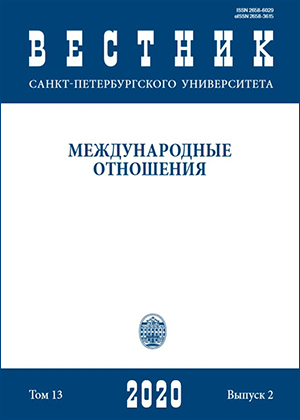Russian politics in the Korean direction: Priorities, challenges, opportunities
DOI:
https://doi.org/10.21638/spbu06.2020.205Abstract
This article analyses the results of thirty years of Russia’s policy towards the Korean peninsula, since the establishment of diplomatic relations between Moscow and Seoul in 1990. The dynamics, scale, and nature of the economic interaction between the two countries are assessed against the backdrop of stagnation, in the same period, in trade and economic relations between Russia and the DPRK. The main trends of South Korean private investments in Russia are examined. A lack of progress is observed in the implementation of major projects in transport, gas industry, and electric power industry, which imply trilateral cooperation between Russia, South Korea, and North Korea. Despite political dialogue at a bilateral level between Moscow and Seoul, Moscow and Pyongyang, the instability of inter-Korean relations has become a serious obstacle to the implementation of trilateral projects. The main challenges faced by North and South Korea, their priorities in foreign policy, the possibility of developing inter-Korean relations in these conditions, and the position of Russia and China on a Korean settlement are compared. The possible economic transition of DPRK to a market economy is also analysed as a factor in regional cooperation. The role and position of Russia and China on negotiations of North Korea’s missile and nuclear projects are described as well as the assessment of prospects for strengthening Russian policy on the Korean peninsula in economics, political and security issues. Lastly, the correlation of Russian regional developmental priorities with the position of South Korea on this issue is considered and an outlook on the integration processes in Northeast Asia with the participation of China, Japan, and the ROK, and the possibility of Russia’s cooperation, is provided.
Keywords:
APR, Indo-Pacific region, regional integration, mega-projects, USA, China, Japan, India, the Republic of Korea, Russia
Downloads
References
Промышленная революция усилит Россию // Газета.ru. 2018. 20 июня. URL: https://gazeta.ru/ business/2018/06/19/11807491.shtml (дата обращения: 16.02.2020).
Внешняя торговля России. URL: https://russian-trade.com/reports-and-reviews/2020-02/tor (дата обращения: 16.01.2020).
Trade Map. International Trade Statistics. URL: https://www.trademap.org/tradestat (дата обращения: 15.02.2020).
Policy Tasks. Five-year Plan of the Moon Jae-in Administration // Korea/net. URL: www.korea. net/Resources/Publications/About-Korea/view?articleld=7959 (дата обращения: 21.01.2020).
Foreign Minister Sergey Lavrov’s statement at a joint news conference following talks with Foreign Minister of the Republic of Korea Kang Kyung-wha Moscow, June 17, 2019 // Сайт МИД РФ. 17.06.2019. URL: http://www.mid.ru/web/guest/meropriyatiya_s_uchastiem_ministra/-/asset_publisher/xK1BhB2bUjd3/content/id/3686129?p_p_id=101_INSTANCE_xK1BhB2bUjd3&_101_INSTANCE_xK1BhB2bUjd3_ languageId=en_GB (дата обращения: 11.07.2019).
Moon Jae-In’s policy on the Korean peninsula. A peninsula of peace and prosperity. Seoul: Ministry of unification, 2018. 35 p.
Мы вместе стремимся к общей цели // Интервью президента Республики Корея Мун Чжэ Ина «Российской газете». 21.06.2018. URL: https://rg.ru/2018/06/21/mun-chzhe-in-rasskazal-o-perspektivah-sotrudnichestva-rossii-rk-i-kndr.html (дата обращения: 23.02.2020).
Lawrence, R. Z. (2018), Can the Trading System Survive US-China Trade Friction? China and World Economy, vol. 26, no. 5, pp. 62–82.
Evans, G. (2018), Australia and South Korea Strengthening Middle-Power Bonds, Global Asia, vol. 13, no. 2, pp. 74–81.
The industrial revolution will strengthen Russia, (2018), Gazeta.ru, June 20. Available at: https://gazeta.ru/business/2018/06/19/11807491.shtml (accessed: 16.02.2020). (In Russian)
Ben Hong Sop (2016), Prospects for Russian-Korean cooperation in the field of investment and development of the Far East, Perspektivy rossiisko-koreiskikh otnoshenii na period do 2030 g. Rabochaia gruppa DRRK “politika i mezhdunarodnye otnosheniia”. Seul, “Dialog Rossiia — Respublika Koreia” Publ., pp. 235– 266. (In Russian)
Kuznetsova, O. (2018), Eastern vector of investment relations in Russia, Mirovaia ekonomika i mezhdunarodnye otnosheniia, vol. 62, no. 2, pp. 47–57. (In Russian)
Foreign Trade of Russia. Available at: https://russian-trade.com/reports-and-reviews/2020-02/tor (accessed: 16.01.2020). (In Russian)
Trade Map, International Trade Statistics. Available at: https://www.trademap.org/tradestat (accessed: 15.02.2020).
Song Byung Jik (2019), A new perspective for cooperation between the Republic of Korea and the Russian Federation in the far East, Problemy Dal`nego Vostoka, no. 4, pp. 104–110. (In Russian)
Policy Tasks. Five-year Plan of the Moon Jae-in Administration, Korea/net. Available at: www. korea.net/Resources/Publications/About-Korea/view?articleld=7959 (accessed: 21.01.2020).
Choi He-Suk Moon says “new order” being formed on Korean Peninsula (2018), The Korea Herald, October 8. Available at: http://www.koreaherald.com/view.php?ud=20181008000554 (accessed: 14.01.2020).
Bulychev, G. K., Korgun, I. A. (2019), Sanctions and their consequences for North Korea’s trade and economy, Problemy Dal`nego Vostoka, no. 5 (2), pp. 64–75. (In Russian)
Davydov, O. V. (2019), Why is the nuclear settlement process on the Korean Peninsula stalling, IME`MO RAN, December 16. Available at: https://www.imemo.ru/index.php?page_id=502&id= 5537&p=27ret=527 (accessed: 22.12.2019). (In Russian)
Foreign Minister Sergey Lavrov’s statement at a joint news conference following talks with Foreign Minister of the Republic of Korea Kang Kyung-wha Moscow (2019), MID RF, June 17. Available at: http://www.mid.ru/web/guest/meropriyatiya_s_uchastiem_ministra//asset_publiser/xK1BhB2bUjd3/ content/id/3686129?p_p_id=101_INSTANCE_xK1BhB2bUjd3&_101_INSTANCE_xK1BhB2bUjd3_ languageId=en_GB (accessed: 11.12.2019).
Mereminsky, E., Cervone, A., Yastrebova, C. (2020), The industry changed the year, Vedomosti, February 18, p. 4. (In Russian)
Zabrovskaya, L. (2019), Economic relations of the Russian Far East with the Korean States, Mirovaia ekonomika i mezhdunarodnye otnosheniia, vol. 63, no. 11, pp. 114–121. (In Russian)
Burlakova, E. (2020), Margin in greenhouse conditions, Vedomosti, February 19, p. 12. (In Russian)
Moon Jae-In’s policy on the Korean peninsula. A peninsula of peace and prosperity (2018), Seoul, Ministry of unification.
Together we strive for a common goal (2018) Rossiiskaia gazeta, June 21. Available at: https:// rg.ru/2018/06/21/mun-chzhe-in-rasskazal-o-perspektivah-sotrudnichestva-rossii-rk-i-kndr.html (accessed: 23.02.2020). (In Russian)
Ivanovitch, M. (2019), China-Japan-South Korea Summit: Business alone won’t heal deep wounds, CNBC, December 30. Available at: https://cnbc.com/2019/12/30/china-japan-south-korea-summit-business-alone-wont-heal-deep-wounds.html (accessed: 10.02.2020).
Danson Cheong, China, Japan, South Korea leaders to promote free trade regime, North Korea — US dialogue. Available at: https://www.straitstimes.com/asia-east-asia/china-japan-south-korea-to-promotenorth-korea-us-dialogue (accessed: 24.12.2019).
Downloads
Published
How to Cite
Issue
Section
License
Articles of "Vestnik of Saint Petersburg University. International relations" are open access distributed under the terms of the License Agreement with Saint Petersburg State University, which permits to the authors unrestricted distribution and self-archiving free of charge.




